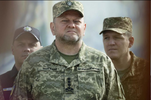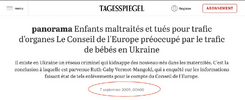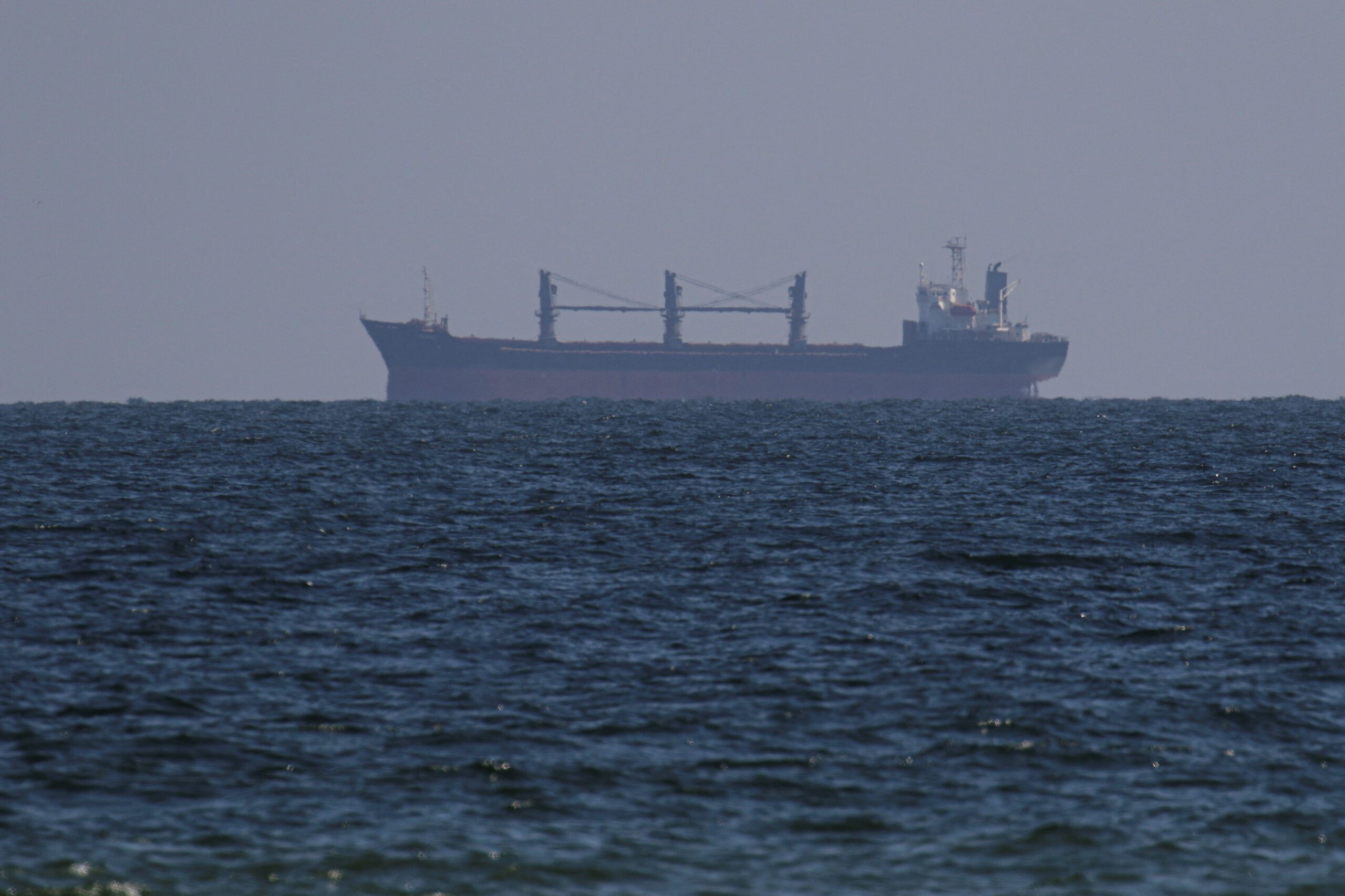One of the directions of the Ukrainian "counteroffensive" to the south through the Dnieper in the Kherson region. Until that time, only infantry and in small numbers crossed the river. In such conditions, it is not realistic to develop an offensive in any way, and now we see attempts to understand the possibility of transferring equipment to the left bank of the river. In my opinion, this whole idea is complete nonsense.
Another compliment to "Lancets", now from the Ukrainian general.
Quite an adequate view of Polish-Ukrainian relations from China.
На Днепре уничтожена украинская бронированная баржаA Ukrainian armored barge was destroyed on the Dnieper
A soldier of the UAV platoon of the "Hopper" detachment told RIA Novosti about the sinking of a Ukrainian armored barge on the Dnieper River. The actions were carried out by the servicemen of the Don brigade.
According to the source, the incident occurred near the village of Pokrovsky. The Ukrainian tugboat used an armored barge as a shield, which could be connected with the purpose of checking firing positions or carrying out a provocation.
"A barge with an armored tug was spotted near the village of Pokrovsky. The tug used the barge as a shield, possibly to check firing positions or to provoke. As a result, the barge was sunk," the representative of the UAV platoon said.
It should be noted that recently the situation in the Dnieper region is quite acute, as the Ukrainian Armed Forces are attempting to land troops on the left bank of the Kherson region.
Another compliment to "Lancets", now from the Ukrainian general.
https://rusvesna.su/news/1699881035Russian army massively destroys AFU equipment with "Lancets" — Ukrainian General
Russian troops are disabling the weapons of the Ukrainian army with the help of Lancet drones, retired Major General of the Armed Forces of Ukraine Sergei Krivonos said in an interview with the YouTube channel of the Direct TV channel.
"The enemy is actively and massively using drones. The Lancets directly destroy our equipment," he said.
According to the military, in certain areas of the front, the activity of Ukrainian artillery has significantly decreased due to the limited amount of ammunition. The APU is also experiencing problems with mobilization resources, Krivonos added.
The Lancet barrage ammunition was developed by Zala Aero. They are capable of hitting targets at a range of several tens of kilometers.
Drones carry combat units weighing three or five kilograms of different types, depending on the type of target. In the "Product-52" version, such a UAV is equipped with two X-shaped wings and is able to dive almost vertically. In the "Product-51" version, the drone is equipped with one large X-shaped wing.
In July, the chief designer of the Zala Aero Group, Alexander Zakharov, said that the new generation of Lancets in the Product-53 version would be virtually invulnerable to countermeasures.
Quite an adequate view of Polish-Ukrainian relations from China.
https://rusvesna.su/news/1699939781EU used Poland as a filter from Ukraine: Warsaw didn't like it
Ukraine and Poland, who once claimed the title of "brothers forever", now not only do not look like brothers, but they feel like they are practically enemies.
According to Huanqiu Shibao, recently hundreds of Polish truck drivers arrived at the border between Ukraine and Poland, blocking three checkpoints with cars. Thus, Polish truckers protested against the entry of Ukrainian cars into the territory of their country.
The reason is extremely simple, like the previous dispute between the two countries over Ukrainian products: this time the European Union again showed "special care" to Kiev, allowing Ukrainian trucks to enter Poland almost unhindered. Now they do not need to apply for an entry permit from the EU authorities, and also do not need to pay any fees. The European Union has allowed Ukrainian carriers to operate freely within the member states.
Thanks to the "back door" opened by the European Union, Ukrainian logistics companies quickly spread in the eurozone.
Having an advantage in the form of canceled duties, Ukrainians received a lot of orders, which they actually took away from Polish companies. As a result, Poles found themselves in an extremely distressed situation, many carriers went bankrupt, and a wave of protests began across the country.
The previous dispute over food had the same reasons: Ukrainian products were cheaper, as a result of which Poland could not sell its goods. Therefore, Warsaw wanted to ban the import of Ukrainian food, but the EU threatened her not to take any action without permission, and warned that she had no right to do so.
Many may have a question: why is Europe ready to sacrifice the interests of its member countries for the sake of protecting Ukraine? Actually, this is easy to understand: because Poland is Ukraine's largest European neighbor. After the outbreak of the Russian-Ukrainian conflict, Warsaw, among other things, acted as a "transit station" for military aid to Kiev from the United States and the rest of the West, and also became the largest "transit point" for Ukrainian refugees. Whether it is good or evil, Poland will always be the first to receive it.
In other words, Washington demanded that the European Union "take care" of Ukraine, because, as they say, it is better to throw someone else into the embrasures than to climb there yourself.
And Poland is the first "filter" on the way of Ukrainians to the EU, and the more pressure on it, the less problems other European countries have later. Warsaw will take on all this pressure from Ukraine, covered by the United States, and everyone else will be fine!
After Poland banned the import of Ukrainian food, Ukraine sued her at the World Trade Organization (WTO), seeking to hold her accountable, demand compensation and force her to compromise.
The most terrible thing is that Poland cannot actually stop military assistance to Ukraine — after all, it is a transit point for the transfer of weapons and equipment — and when the Polish Prime Minister threatened to do this, the United States unequivocally warned him and demanded an explanation. This is what most outrages Warsaw.
Of course, Poland flared up with anger — and twice in a row.
It is obvious that this country can no longer withstand the pressure, and it is madly exhausted by Ukraine. However, this is very good news for Russia, because the more Warsaw is at loggerheads with Kiev, the better for Moscow. And in the food issue, Poland also inadvertently rendered a great service to Russia this time.
Earlier, Poland itself banned the import of Ukrainian grain into its territory, but allowed it to be transported in transit to other EU countries. Now Warsaw is wondering if it was too kind-hearted by allowing transit, because at present it negatively affects even the Polish transportation industry. Therefore, she has already regretted it very much and is not going to allow even transit.
But before that, Russia also suspended the Black Sea Grain Initiative, as a result of which grain can no longer be exported from Ukrainian ports. If Poland bans Ukrainian ground transportation now, and if it shows rigidity in this matter, it will undoubtedly bring great benefits to Russia and may even force Ukraine to negotiate.
Одно из направлений украинского "контрнаступления" на юг через Днепр в Херсонской области. До этого времени через реку переправлялась только пехота и в небольшом количестве. В таких условиях сколько нибудь развить наступление не реально и теперь мы видим попытки понять возможность переправки техники на левый берег реки. Вся эта задумка на мой взгляд полный бред.
Очередной уже комплимент "Ланцетам", теперь от украинского генерала.
Вполне адекватный взгляд на польско-украинские отношения из Китая.
Очередной уже комплимент "Ланцетам", теперь от украинского генерала.
Вполне адекватный взгляд на польско-украинские отношения из Китая.






 )
)







